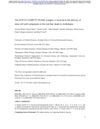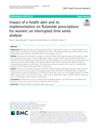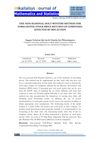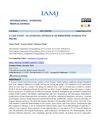 3 citations,
April 2011 in “Expert Review of Dermatology”
3 citations,
April 2011 in “Expert Review of Dermatology” Male hair loss is caused by inactive hair follicle stem cells.
 3 citations,
November 2009 in “BMC dermatology”
3 citations,
November 2009 in “BMC dermatology” Dermatologists' treatment of alopecia areata is inconsistent, especially for children and advanced stages.
 2 citations,
June 2022 in “Scientific reports”
2 citations,
June 2022 in “Scientific reports” Women with PCOS have higher hair cortisol levels, which are linked to worse metabolic and inflammatory conditions.
 2 citations,
December 2020 in “bioRxiv (Cold Spring Harbor Laboratory)”
2 citations,
December 2020 in “bioRxiv (Cold Spring Harbor Laboratory)” The SYP123-VAMP727 complex is important for transporting materials that harden the root hair shank in Arabidopsis.
 2 citations,
August 2020 in “Clinical, Cosmetic and Investigational Dermatology”
2 citations,
August 2020 in “Clinical, Cosmetic and Investigational Dermatology” The hair-growth formula with L-cystine helps protect and grow hair cells.
 2 citations,
June 2020 in “BMC Health Services Research”
2 citations,
June 2020 in “BMC Health Services Research” Health warnings and public health actions led to a significant drop in flutamide prescriptions for women, but off-label use still continues.
 2 citations,
November 2019 in “Cancer reports”
2 citations,
November 2019 in “Cancer reports” The Wnt signaling pathway is not a major factor in the development of keratoacanthoma, a type of skin tumor.
 2 citations,
November 2017 in “Food Additives & Contaminants: Part A”
2 citations,
November 2017 in “Food Additives & Contaminants: Part A” The new method accurately detects illegal hair-growth drugs in dietary supplements.
 2 citations,
December 2014 in “Research & Reviews: Journal of Pharmacy and Pharmaceutical Sciences”
2 citations,
December 2014 in “Research & Reviews: Journal of Pharmacy and Pharmaceutical Sciences” Carrot extract in gel form may help hair grow better.
 2 citations,
February 2014 in “Hair therapy & transplantation”
2 citations,
February 2014 in “Hair therapy & transplantation” Alopecia Areata is an autoimmune condition causing hair loss, influenced by genetics, environment, and possibly improved by anti-MIF therapy, with many patients experiencing regrowth within a year.
 2 citations,
January 2014 in “Elsevier eBooks”
2 citations,
January 2014 in “Elsevier eBooks” The document concludes that reactivation of herpesviruses, especially HHV-6, is linked to severe symptoms and complications in drug-induced hypersensitivity syndrome.
 2 citations,
January 2014 in “International Journal of Endocrinology”
2 citations,
January 2014 in “International Journal of Endocrinology” Women with a certain type of tumor had higher levels of pregnancy hormone and male hormones, which decreased after treatment.
 1 citations,
June 2018 in “Advances in Cosmetic Surgery”
1 citations,
June 2018 in “Advances in Cosmetic Surgery” PRP might help with hair growth and skin rejuvenation, but more research is needed to prove its effectiveness.
 1 citations,
October 2017 in “Food Additives & Contaminants: Part A”
1 citations,
October 2017 in “Food Additives & Contaminants: Part A” A new minoxidil-like substance, triaminodil, was found in an illegal hair growth supplement.
 1 citations,
January 2013 in “Springer eBooks”
1 citations,
January 2013 in “Springer eBooks” Cosmeceuticals may benefit skin health but need more research for efficacy and safety confirmation.
 1 citations,
December 2011
1 citations,
December 2011 Marine-derived ingredients show potential for hair health but need more human trials to confirm effectiveness.
 1 citations,
October 2010 in “Cambridge University Press eBooks”
1 citations,
October 2010 in “Cambridge University Press eBooks” Hormonal therapies are effective for managing hair and skin symptoms in women with PCOS.
 1 citations,
December 1997 in “Journal of The European Academy of Dermatology and Venereology”
1 citations,
December 1997 in “Journal of The European Academy of Dermatology and Venereology” All women with significant unwanted hair growth have hormonal imbalances, often from polycystic ovary syndrome.
 1 citations,
January 1997 in “Dermatology”
1 citations,
January 1997 in “Dermatology” A woman lost her hair from stress after a bee attack and her sister's death.
 1 citations,
September 1984 in “Journal of Biological Education”
1 citations,
September 1984 in “Journal of Biological Education” Plants change their growth in response to shade based on light signals detected by phytochrome.
 May 2024 in “Scientific Reports”
May 2024 in “Scientific Reports” Androgen receptors in the mouse brain may explain cognitive and mood changes in prostate cancer treatment.
 April 2024 in “BMB Reports”
April 2024 in “BMB Reports” Lack of Cisd2 disrupts calcium balance in cells, leading to poorly functioning neutrophils.
 April 2024 in “International Journal of Research Publication and Reviews”
April 2024 in “International Journal of Research Publication and Reviews” Alopecia areata causes hair loss with varied treatment responses and frequent relapses.
 April 2024 in “bioRxiv (Cold Spring Harbor Laboratory)”
April 2024 in “bioRxiv (Cold Spring Harbor Laboratory)” A gene network led by RSL4 is crucial for early root hair growth in response to cold in Arabidopsis thaliana.
 March 2024 in “Frontiers in reproductive health”
March 2024 in “Frontiers in reproductive health” Women of color in Northern Manhattan view hair care as important to their identity and culture, and education on harmful chemicals in hair products is needed.
 March 2024 in “Research Square (Research Square)”
March 2024 in “Research Square (Research Square)” Combining genetic and physical trait analysis improves diagnosis accuracy for monogenic diabetes.
 March 2024 in “Journal of medicinal plants studies”
March 2024 in “Journal of medicinal plants studies” Hibiscus has medicinal benefits but can be toxic in high doses and is unsafe for pregnant women and infants.
 February 2024 in “BioMetals”
February 2024 in “BioMetals” Heavy metals like arsenic, cadmium, and lead can increase cancer risk and worsen outcomes.
 February 2024 in “Mikailalsys Journal of Mathematics and Statistics”
February 2024 in “Mikailalsys Journal of Mathematics and Statistics” The method accurately predicted stock price changes, showing most companies' returns decreased due to BDS actions.
 January 2024 in “International Ayurvedic medical journal”
January 2024 in “International Ayurvedic medical journal” The Ayurvedic treatment helped a woman with PCOS, improving her symptoms and menstrual cycle.






























